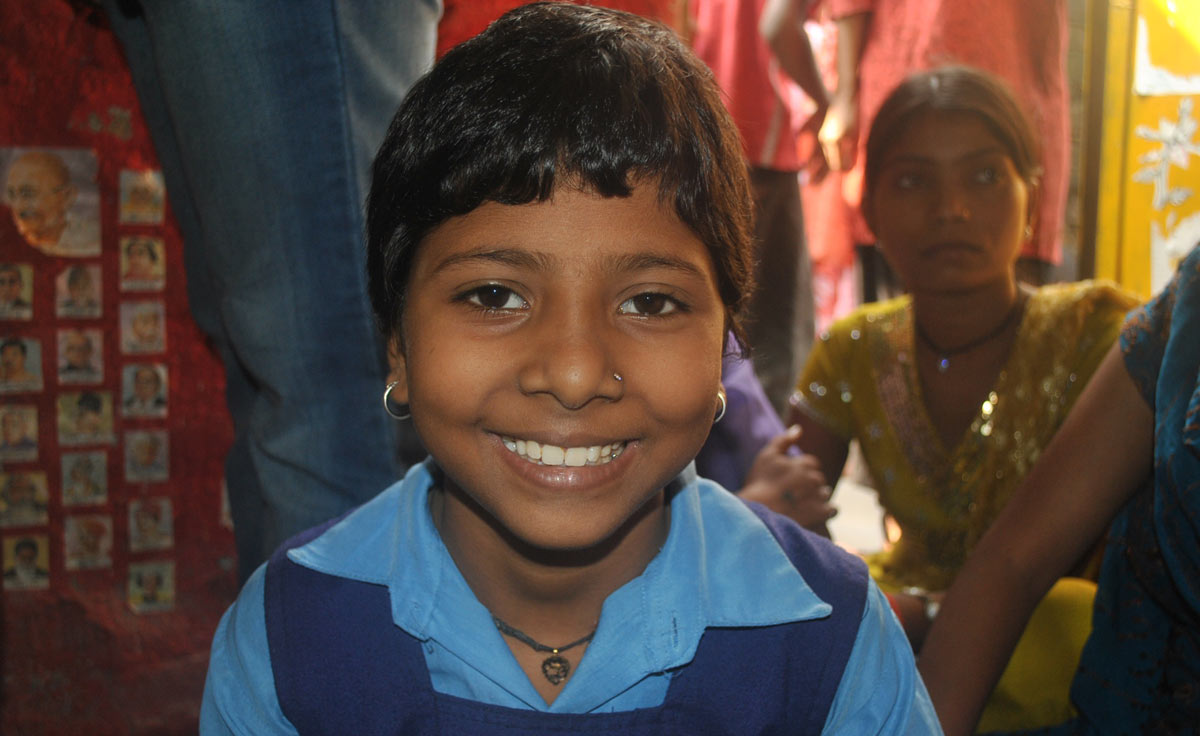“Traversing through the rich plains and the busy streets of Haryana; I saw men, busy men strolling, walking and running engulfed in the flames of the rising activities of the day. When the car steered clear of the buzz of the putative urban life; I caught a glimpse of the ploughed fields and tiny shops serving delectable snacks. I was injected with mixed feelings. Juxtaposed with the glaring promising productivity
Juxtaposed with the glaring promising productivity was an observation that cannot be left ignored- Where are the women?”
A country that has been promising to cut edge in various social, economic and political sectors, the acceptance and empowerment of girls in the society and families stand questioned. Gender based sex selection and lack of girls’ access to education constitute the two major areas where the rigid patriarchal mindset of the people and the society at large are exhibited. Amidst the myriads of social issues and challenges, a declining child sex ratio (number of females per 1000 males) is raising innumerable questions about society’s perception about girl child. A vehement opposition tosuch perceptions and ideologies smeared with patriarchy is manifested in the launch of Beti Bachao Beti Padhao on 22ndJanuary, 2015 by the Government of India at Panipat, Haryana.
THE ORIGIN OF THE DISCRIMINATION
Preference for sons in quintessential patriarchal Indian families is not new. However, this preference conflates with apathy towards the daughters. What leads to this rising preference for boys in society? It is reflected in the common and existing assets vs. liability discourse in families. Young unmarried women in families are generally perceived as liabilities to given to ‘others’ after marriage. ‘Woapnegharki ho jaayegi’ (She will belong to her house) is one of the widely prevalent phrases that is disallowing a family to invest on girls’ education. Family members of a girl prefer to give money as dowry to her husband’s family rather than spend it on her education; failure to do so might place them at the receiving end of opprobrium affecting their social status in the community. In stark contrast to the position of girls, boys are elevated to the status of an asset in the family due to his status as a “bringer of wealth” to the household.
What leads to this rising preference for boys in society? It is reflected in the common and existing assets vs. liability discourse in families. Young unmarried women in families are generally perceived as liabilities to given to ‘others’ after marriage. ‘Woapnegharki ho jaayegi’ (She will belong to her house) is one of the widely prevalent phrases that is disallowing a family to invest on girls’ education.
THE MOVEMENT
BetiBachaoBetiPadhao Movement celebrates the birth and empowerment of girl child in the light of rising PCPNDT Act violations. The Movement serves as the stepping stones for reaching the higher levels of female empowerment. The nomenclature reeks of posing demands for women’s rights in two sequential orders. Advocating women’s right to education and creating awareness about the necessity of female education amongst the people would only be made possible through decreasing gender based sex selection, encouraging community and family members to give birth to girls and ensuring their safety within and outside their homes. It is clear that the goal of the Movement is two-fold- save the girl child and educate the girls. However, its essence lies in its efforts in minimising the extent of internalisation of the dominant ideals and to mitigate the rigid perception which bear the potential to thwart the achievement of these goals. In its attempts at promoting the Right to Live, the Campaign lays the foundation for the community members to recognise women as fellow human being. While the humanistic tone is inherent in this demand for women to live, the Campaigns efforts at educating and empowering girls aims at transforming people’s perception of girls from a mere liability and a way lose one’s social standing into potential assets for the development of society. This change in perception and recognition of girls’ rights in its nascent stage which has the ability to shake the tight shackles of patriarchy often face trenchant resentment from its ardent followers, men and women alike; the same group of people who could be hold responsible for the deprivation of women’s fundamental rights.
HOW DO WE MOVE FORWARD?
Under the scheme ‘Beti Bachao Beti Padhao’, adequate steps must be adopted and various innovative methods designed for creating knowledge and awareness amongst people and stretching the reach of the primary goals of the campaign to the remotest and the untouched areas of the country. At the organisational level; an enhancement in the child sex ratio could be achieved by organising rallies and
demonstrations; conducting workshops in every possible district with slogans emphasising the importance of the Movement that can capture the attention of the people around. At the end of every
event, the perspective of the people can be noted that would assist in assessing the impact of the campaign and test their level of understanding of the Movement.
Through campaigns like ‘Beti BachaoBetiPadhao’, a rigorous attempt is being made to enable the women to recognise and exercise their agency to find their voices and use them to condemn the ploy, a piece of a bigger puzzle to make them ‘voiceless’, literally and figuratively.
CSR AND Beti Bachao Beti Padhao
““The government should take it as an emergency call. The solution is nothing but strict implementation of the PNDT Act. Ultrasound machines are so faulty that even quacks have access to them. Unless we strengthen and effectively implement this law, sex ratio would not improve,”– Ranjana Kumari, chairperson of Centre for Social Research.
“ We’ll need a multi-pronged approach to solve this problem (of low child sex ratio) which should include medical audit, social audit, spreading awareness related to this issue as well as the negative consequences one can face”- Manasi Mishra, Research Head, CSR
For ensuring the effective implementation of the Campaign, the Ministry of Women and Child Development appointed Centre for Social Research as the nodal agency for ensuring the effective implementation of BetiBachaoBetiPadhao in five gender critical districts of Haryana viz Ambala, Gurugram, Kurukshetra, Jhajjar and Mahendragarh. CSR that aims at working for women’s welfare has earned significant achievements with regards to maintaining sex ratio balance in the aforementioned districts. Community Watch Groups (CWGs) has been established in all the low sex ratio villages of the 5 districts. The CWG’s are responsible for disseminating information regarding BBBP, financial incentives for girl child, PC/PNDT Act, as well as encouraging the community members to enroll their girls in higher educationand other skill based education etc.The exercise, in addition to establishing rapport with various District Officials has yielded positive results that are reflected in an enhancement of sex ratio in the designated areas and successful Panchayati Raj Trainings in all the 5 districts.
On 19.12.2019, a rally was organized in the Mahendragarh district of Haryana, a region with skewed sex ratio. The event, in addition to spread information about the core idea of Beti Bacho Beti Padhao, alsoaimed at disseminating awareness about the importance of girls’ rights, gender equality and ending discrimination. The event yielded positive results as it saw a high level of enthusiastic participants seemingly ready to endorse the Movement and its ideas.
CSR has also been selected as Member of the State PC/PNDT Advisory Committee in Panchkula, Haryana. Some of the multi-pronged activities of CSR include community mobilization for behavioral change, support effective implementation, monitoring and evaluation of PC/PNDT Act, advocating for Government’s engagement at the Village, Block and District level in addressing ‘BetiBachaoBetiPadhao’ program, district level institutional networking and roundtable at the end of the Program Intervention.
On 24th January 2019, the CSR team members were invited to participate in the “National Girl Child Day” celebration organized by the MWCD at the PravasiBharatiya Kendra, New Delhi. Here, two out of five of our gender critical districts were awarded; District of Jhajjar received an award in the category “Enabling Girl Child Education” and Kurukshetra won in the category “Enforcement of Pre Conception and Pre Natal Diagnostics Techniques (PC/PNDT) Act”.
In a world brimming with the agents of patriarchy, everyone deserves to have a voice and every voice deserves to be heard but the efforts to throttle these voices continue simultaneously with resistance. Through campaigns like ‘Beti Bachao Beti Padhao’, a rigorous attempt is being made to enable the women to recognise and exercise their agency to find their voices and use them to condemn the ploy, a piece of a bigger puzzle to make them ‘voiceless’, literally and figuratively.





